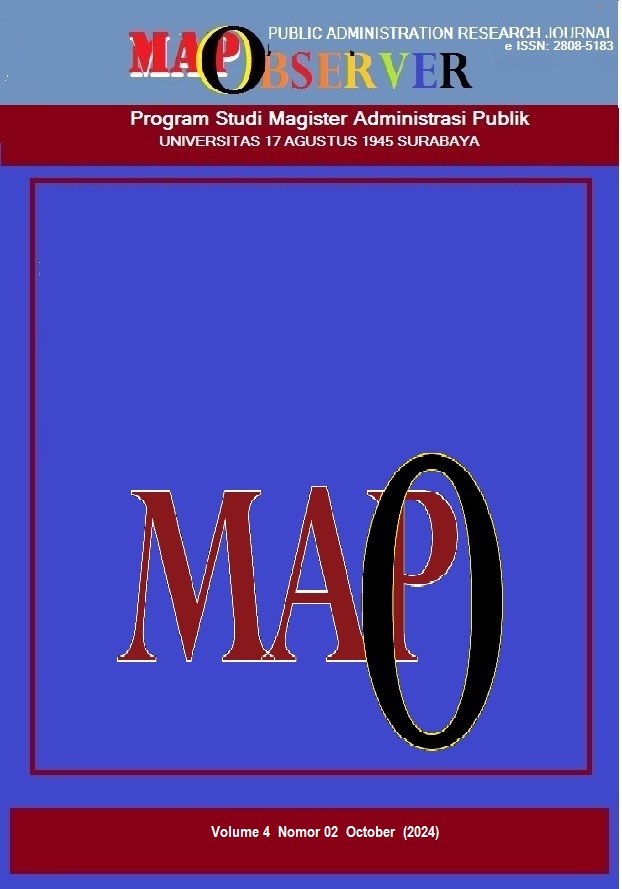VILLAGE GOVERNMENT PERFORMANCE TO IMPROVE POPULATION ADMINISTRATION SERVICES IN WANGUN VILLAGE, PALANG-TUBAN DISTRICT
DOI:
https://doi.org/10.30996/mapo.v4i02.11219Keywords:
Village Government, Performance, Improve Population Administration Services, Wangun VillageAbstract
In Law Number 6 of 2014 it tries to return the concept and form of the Village as it originates, the Village or is called by another name, is a legal community unit that has the authority to regulate and administer the interests of the local community based on recognized local origins and customs in the national government system and are in the District Region. Villages can be formed, deleted, and/or merged with due observance of their origin at the initiative of the community with the approval of the Regency Government and DPRD. Substantively the Village Law This implies an effort to empower village government apparatus and also the community village. Village Government or in the form of other names such as Marga Government, its existence is dealing directly with the community, as the spearhead foremost government. Implementation of village autonomy characterized by good service either can provide satisfaction for people who need it because it's fast, easy, precise and at an affordable cost, therefore implementation in the field must be supported by the factors involved in the implementation of the village policy. Perception officials regarding their work depends on the level of intrinsic and extrinsic outcomes and how workers/employees view these outcomes and reflect attitudes toward them his job. Mental attitude is a mental condition that encourages someone to strive to achieve maximum work potential. The performance of the Wangun village government has not quite good in terms of productivity, service quality and service accountability from the aspect of mental attitude and behavior of village officials in the management of certificates towards society.
Downloads
References
Bungin Burhan, (2002). Metode Penelitian Kualitatif, Rajawali Pers, Jakarta.
Dwiyanto, Agus, dkk, (2002), Reformasi Birokrasi di Indonesia, Yogyakarta, Pusat Studi Kependudukan dan dan Kebijakan, UGM.
Dharma Agus, (2003). Manajemen Supervisi, Rajawali Pers: Jakarta. Gibson, 2003. Perilaku Manajemen Organisasi, Erlangga: Surabaya.
John Ivancevich, (2006). Perilaku dan Manajemen Organisasi, Erlangga: Surabaya
Mangkunegara Prabu Anwar, (2005). Manajemen dan Motivasi, Balai Pustaka: Jakarta.
Peraturan Pemerintah No. 37 Tahun 2007 tentang Pelaksanaan Undang-Undang No. 23 Tahun 2006 tentang Administrasi Kependudukan
Peraturan Pemerintah Nomor 43 Tahun 2014 Tentang Petunjuk Pelaksanaan Undang-Undang Nomor 6 Tahun 2014 Tentang Desa.
Prawirosentono, (1999). Bahasa Komphrehensif Strategi Pengambilan Keputusan, Bumi Aksara: Jakarta.
Siagian S.P, (1997). Manajemen Sumber Daya Manusia, Bumi Aksara, Jakarta
Sinungan, (2001) Produktivitas: Apa dan Bagaimana, Edisi Ke-2, Cetakan Ke-3, Bumi Aksara, Jakarta,
Simanjuntak, Payaman J. (2005). Manajemen dan Evaluasi Kerja. Lembaga Penerbit FEUI, Jakarta.
Suradinata, (1996). Manajemen Sumber Daya Manusia: Suatu Tinjauan Wawasan Masa Depan, Cetakan Pertama, Ramadan, Bandung.
Thoha, Miftah. (2003), Perilaku Organisasi : Konsep Dasar Aplikasinya, Gramedia Pustaka: Jakarta.
Undang-Undang Nomor 6 Tahun 2014 tentang Desa.
Undang-Undang No. 23 Tahun 2006 tentang Administrasi Kependudukan Undang-Undang No. 25 Tahun 2009 tentang Pelayanan Publik
Veithzal Rivai, (2006). Kepemimpinan dan Perilaku Organisasi, Rajawali pers: Jakarta.
Widjaja, (2001). Penyelenggaraan Otonomi di Indonesia, Rajawali Pers: Jakarta
Wibowo, (1999). Manajemen Kinerja, Rajawali Pers: Jakarta
Winardi, (2005). Manajemen Perilaku Organisasi, Graha Pustaka: Jakarta
Downloads
Published
How to Cite
Issue
Section
License
-
The MAP Observer journal allows authors to retain the copyright of their papers without limitation. Authors may grant publishers non-exclusive publishing rights to publish articles. Granting first publishing rights to publishers also qualifies as unlimited copyright (because there are no restrictions imposed by publishers on author copyright).
-
Formal legal provisions for access to digital articles from these electronic journals are subject to the terms of the Creative Commons Attribution-ShareAlike (CC BY-SA) license, which means MAPO Observer Journal has the right to store, change formats, maintain in a database, maintain and publish articles without asking. permission from the Author as long as the Author's name is the owner of the Copyright.
-
Printed manuscripts and electronic publications are open access for educational, research and library purposes. Apart from these purposes, the editorial board is not responsible for violations of copyright law.









